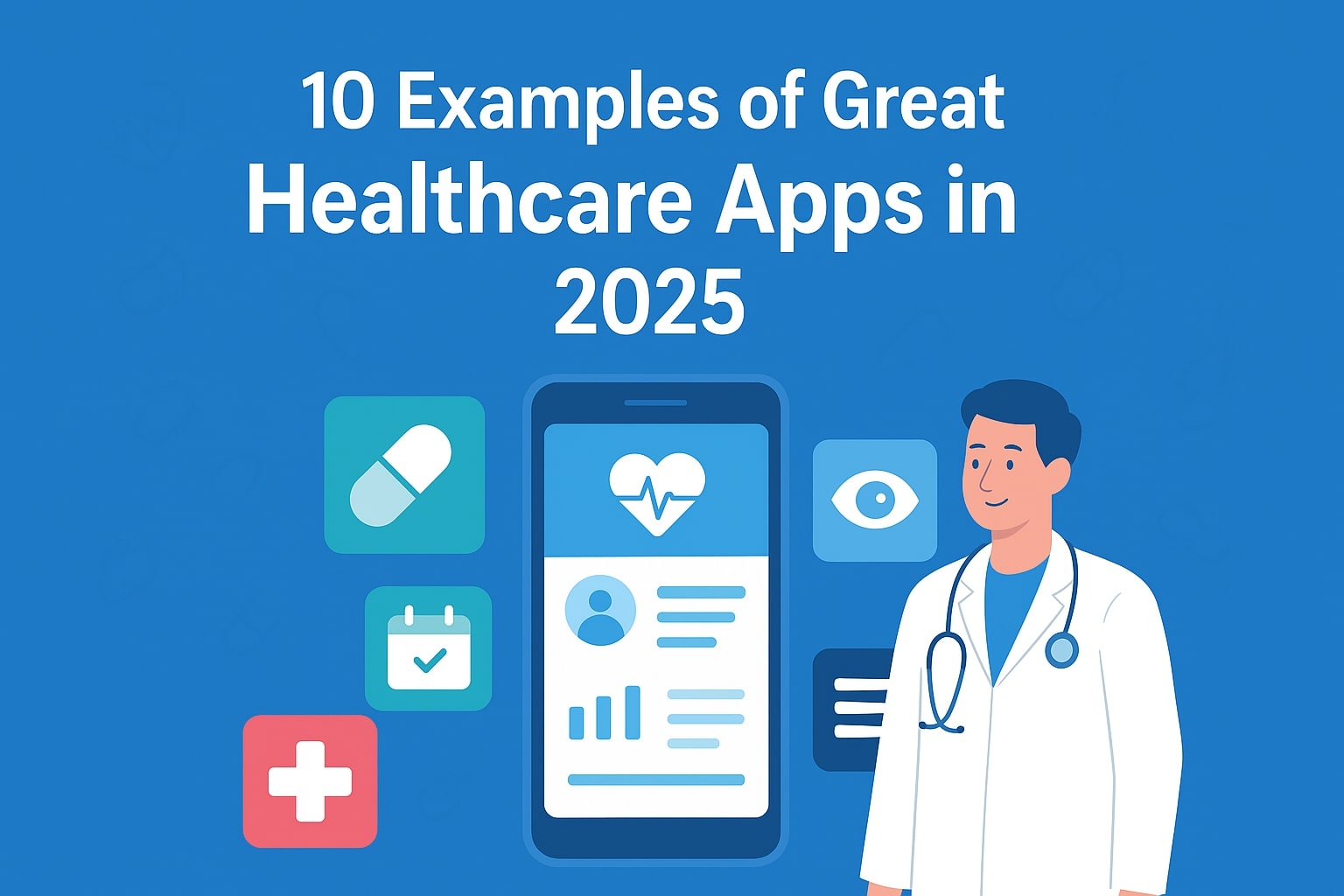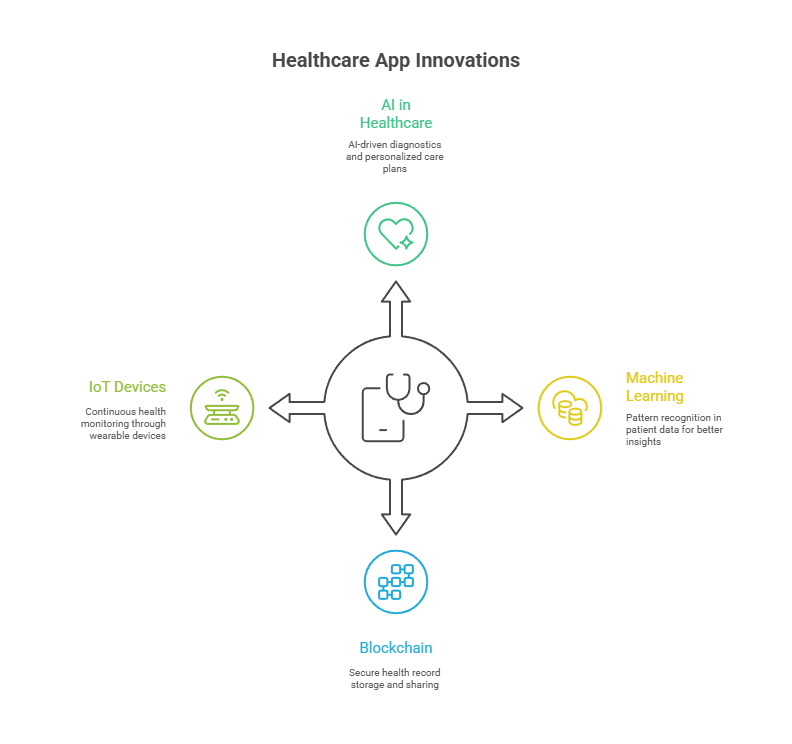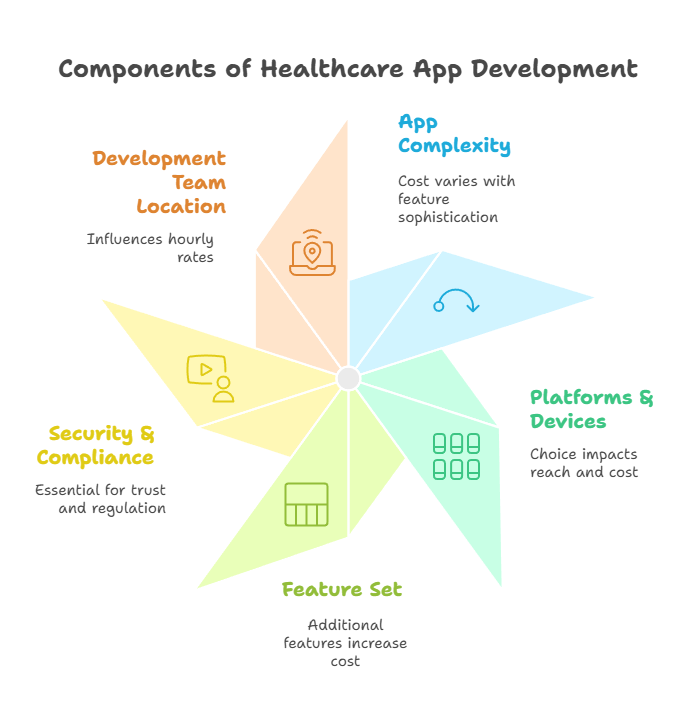
The way consumers communicate with healthcare providers, monitor their health, and obtain medical treatments has been completely transformed by healthcare applications. These applications serve as an essential lifeline in a world when cellphones are almost everywhere, facilitating real-time communication between patients, family members, and healthcare professionals.
Table of Content
These days, healthcare apps come in a huge variety. From straightforward step meters and calorie counters to sophisticated AI-powered platforms that can monitor chronic illnesses, provide remote diagnostics, and interface with wearable medical devices, they are all available. Fast technology improvements and the rising need for remote healthcare solutions are driving the global mHealth (mobile health) app market, which is expected to reach a value of over $200 billion by 2025.

Today’s healthcare apps are powered by cutting-edge technologies like:
These innovations have made healthcare more accessible, personalized, and cost-effective than ever before. From telemedicine platforms to fitness and nutrition tracking tools, the digital health ecosystem is expanding rapidly—and the apps in this space are setting new standards for patient experience.
In this article, we’ll explore some of the most impactful healthcare apps in 2025, examining their core features, how they benefit users, and why they stand out in today’s competitive market.
Healthcare apps are specialized mobile applications designed to support and improve the delivery of healthcare services. They cater to a wide range of needs, from preventive health and wellness tracking to critical medical interventions.
The main functions of healthcare apps can include:

Building a healthcare app isn’t just about writing lines of code — it’s about creating a digital lifeline that can connect patients, doctors, and caregivers in ways that were unthinkable a decade ago. In 2025, healthcare apps are no longer “nice-to-have” conveniences; they’re critical tools shaping how people monitor their health, get treatment, and manage wellness anytime, anywhere.
The process of building a healthcare app starts with identifying a specific healthcare challenge or gap in the market. For example, it could be the need for remote chronic disease monitoring, AI-driven early diagnosis, real-time telemedicine consultations, or personalized fitness and wellness guidance. Once the problem is defined, the app is designed to offer practical, user-friendly, and compliant solutions to meet those needs.
The design phase plays a critical role in ensuring the application is accessible to users of all age groups, health conditions, and technical abilities. It involves creating intuitive navigation, clear visual layouts, and features like multilingual support or voice assistance for inclusivity.
From a technical perspective, building a healthcare app requires integrating advanced features such as:
One of the most crucial aspects of healthcare app development is regulatory compliance and data security. Since healthcare apps handle highly sensitive personal data, they must adhere to strict laws such as HIPAA in the United States, GDPR in Europe, and other region-specific regulations. These laws dictate how patient information should be stored, shared, and protected. This involves incorporating robust encryption, secure login methods like multi-factor authentication, role-based access controls, and regular security audits.
The final stages include testing, deployment, and continuous improvement. Testing ensures that the app performs seamlessly under various conditions, is free from bugs, and delivers an error-free user experience. After launch, ongoing updates are essential to fix issues, enhance performance, and integrate emerging technologies like AI, blockchain, or predictive analytics for improved healthcare delivery.
In essence, building a healthcare app is not just about coding—it’s about creating a reliable, secure, and impactful digital health ecosystem that empowers patients, supports medical professionals, and improves overall healthcare outcomes. The ultimate goal is to make healthcare more accessible, personalized, and efficient, leveraging technology to bridge the gap between medical services and the people who need them.
![]()
The best healthcare apps share common qualities—they are user-friendly, secure, and impactful in improving patient health. They combine advanced functionality with simple, intuitive interfaces to ensure maximum adoption and effectiveness.
Here are 10 standout examples making waves in 2025.
Platforms: Android, iOS, Apple Watch
Medisafe is one of the most widely used medication management apps in the world. Its mission is simple yet critical: to ensure that users never miss a prescribed dose. For patients managing multiple prescriptions—particularly seniors and those with chronic illnesses—this app can be a literal lifesaver.
Key Features:
Why It Stands Out in 2025:
Medisafe’s latest version includes AI-driven adherence predictions, which identify patterns in user behavior and provide proactive reminders or interventions before a dose is missed.
Platforms: Android, iOS
Eyecare Live bridges the gap between patients and licensed eye care professionals through a fully virtual platform. With eye health often being overlooked until serious issues arise, this app ensures timely diagnosis and treatment.
Key Features:
Why It Stands Out in 2025:
Eyecare Live has introduced AI-assisted retina scans that can detect early signs of eye diseases like glaucoma and diabetic retinopathy, enabling preventive care.
Platforms: Android, iOS
Teladoc Health is a global leader in virtual healthcare delivery, offering everything from general medical consultations to specialized therapy and chronic care management.
Key Features:
Why It Stands Out in 2025:
Teladoc’s AI-powered triage system now matches patients with the right specialist in under two minutes, significantly reducing wait times.
Springstone specializes in youth mental health solutions, offering a secure and private platform for mental health screenings and treatment referrals.
Key Features:
Why It Stands Out in 2025:
The app integrates predictive analytics that flag at-risk youth early, enabling timely intervention and support.
Platforms: Android, iOS
MySugr is a diabetes management companion that makes tracking blood sugar levels and carbohydrate intake engaging.
Key Features:
Why It Stands Out in 2025:
MySugr now uses AI to predict blood sugar fluctuations based on logged meals, activity, and stress levels, helping patients take preventive action.
Platforms: Android, iOS
MyChart acts as a patient health portal, connecting individuals with their healthcare providers and giving them direct access to medical records and appointment scheduling.
Key Features:
Why It Stands Out in 2025:
New wearable integration allows MyChart to collect health data like heart rate, oxygen levels, and sleep patterns, enriching the information available to healthcare providers.
Platforms: Android, iOS
Ada Health is an AI-powered symptom assessment tool that guides users toward the right care decisions. Acting like a digital pre-diagnosis assistant, it helps reduce unnecessary hospital visits while ensuring urgent cases get attention.
Key Features:
Why It Stands Out in 2025:
Ada now integrates with wearable health trackers to provide context-aware assessments—meaning the AI can factor in real-time vitals like heart rate, temperature, and sleep quality for more precise insights.
Platforms: Android, iOS, Web
Calmerry connects users with licensed therapists via text, audio, and video sessions, prioritizing accessibility for mental health care.
Key Features:
Why It Stands Out in 2025:
Calmerry’s newest update introduces AI-guided CBT (Cognitive Behavioral Therapy) modules that can be accessed between therapy sessions, ensuring continuous support.
Platforms: Android, iOS, Apple Watch
AliveCor Kardia is a heart health app paired with portable ECG devices, empowering users to monitor their heart rhythms anytime, anywhere.
Key Features:
Why It Stands Out in 2025:
AliveCor now integrates predictive heart health alerts, warning users before irregular rhythms escalate, helping prevent emergencies.
Platforms: Android, iOS
Flo Health is one of the world’s most trusted women’s health and period tracking apps, now expanded into comprehensive reproductive and overall wellness tracking.
Key Features:
Why It Stands Out in 2025:
Flo’s AI now offers predictive hormonal imbalance alerts, helping users spot early signs of conditions like PCOS or thyroid disorders before they worsen.

Building a healthcare app isn’t just about writing code — it’s about combining technology, security, compliance, and user experience into a trusted digital health solution. Here’s what shapes the price tag:
Some of the most in-demand features for healthcare apps in 2025 and their estimated additional cost ranges:
Healthcare apps must comply with strict regulations like:
This adds significant costs for encryption, secure APIs, and regular audits — typically $10,000 – $50,000 depending on scope.
| App Type | Estimated Cost |
| Basic Healthcare Info App | $30,000 – $50,000 |
| Doctor Appointment App | $40,000 – $70,000 |
| Patient Health Portal | $50,000 – $90,000 |
| Telemedicine Platform | $80,000 – $150,000 |
| AI-Powered Diagnostic App | $150,000 – $300,000+ |
| Remote Patient Monitoring App | $100,000 – $250,000 |
Even after your healthcare app goes live, you’ll need a budget for:
The top-performing healthcare apps in 2025 share these traits:
Read More: https://www.code-brew.com/artificial-intelligence-in-healthcare/
Users prefer apps with clean layouts, minimal steps, and personalized experiences that cater to their specific health goals.
Trust is critical—apps must deliver accurate, timely, and secure health information.
Compliance with WCAG 2.1AA ensures inclusivity, and optimization for multiple devices makes apps available to a wider audience.
For Patients:
For Providers:
Partnering with expert developers ensures that healthcare apps are secure, scalable, and patient-focused. Digital agencies bring:
Building a healthcare app isn’t just about coding—it’s about creating a secure, compliant, and life-changing digital solution that patients and providers can truly trust. Here’s why we’re your best partner for the job:
We’ve successfully developed healthcare apps that handle everything from telemedicine consultations to AI-powered diagnostics—always built with industry compliance and patient safety at the core.
HIPAA, GDPR, HL7/FHIR—we don’t just meet these standards, we embed them into your app’s architecture from day one, ensuring zero compliance headaches later.
From AI-driven symptom checkers to wearable integration and real-time health monitoring, we use the latest tech to make your app innovative, reliable, and future-ready.
We craft intuitive, accessible interfaces that make navigating healthcare as simple as checking your messages—so patients love using your app, and providers can work faster.
Your app will grow with you. We build flexible architectures that make it easy to add new features, integrations, and platforms as your healthcare business expands.
No hidden surprises—just clear roadmaps, milestone-based delivery, and predictable costs, so you stay in control from start to finish.
Post-launch, we don’t disappear. We provide 24/7 support, regular updates, and security audits to keep your app performing at its best.
In 2025, healthcare apps are no longer just optional tools — they have become essential companions in managing personal health and well-being. From advanced AI-driven diagnostics to real-time telemedicine consultations and holistic wellness programs, these digital solutions are reshaping the way patients and providers connect. They break down traditional barriers to healthcare access, allowing people in remote or underserved areas to receive timely advice, treatment, and monitoring from the comfort of their own homes.
One of the most significant impacts of these apps lies in their ability to personalize healthcare. By analyzing user data — such as lifestyle habits, wearable device metrics, and medical history — they can deliver tailored recommendations, reminders, and interventions. This not only improves user engagement but also leads to better health outcomes through proactive, preventive care rather than reactive treatment.
However, as powerful as these tools are, responsible use remains critical. Users must be mindful of selecting trusted, secure, and compliant platforms that safeguard their sensitive health data. At the same time, healthcare professionals and app developers must continue working hand in hand to ensure accuracy, accessibility, and ethical AI implementation in these solutions.
The truth is, the future of healthcare is already here — and it’s in your pocket. Whether you’re looking to monitor your fitness, manage a chronic condition, improve mental wellness, or access quality medical advice in minutes, there’s likely an app that can help you achieve it. By embracing these innovations thoughtfully, we can take a major step toward a healthier, more connected, and empowered world.
